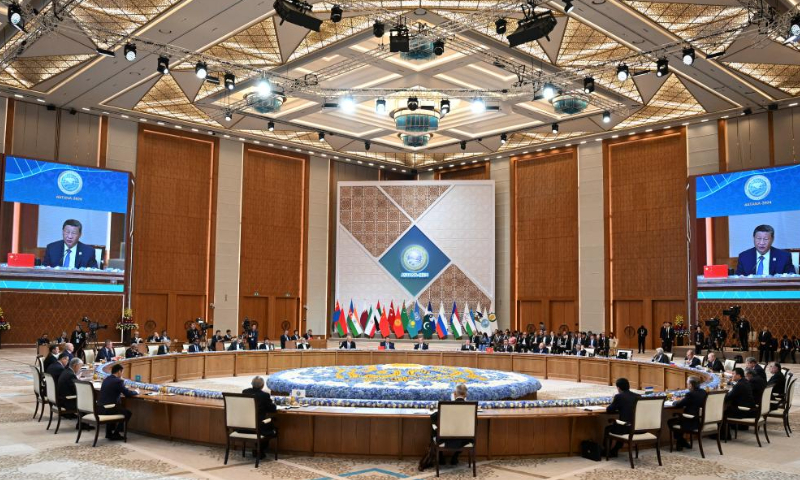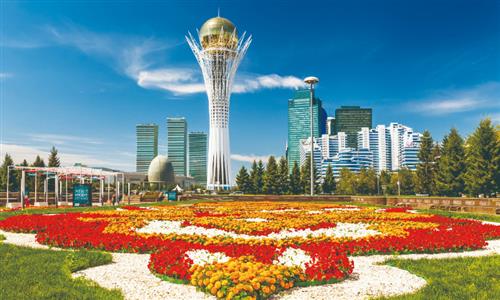
Chinese President Xi Jinping attends the 24th Meeting of the Council of Heads of State of the Shanghai Cooperation Organization (SCO) at the Independence Palace in Astana, Kazakhstan, July 4, 2024. Photo: Xinhua
On the morning of July 4 local time, Chinese President Xi Jinping attended the 24th Meeting of the Council of Heads of State of the Shanghai Cooperation Organization (SCO) at the Independence Palace in Astana, Kazakhstan. For the first time, the summit was held in the form of a "Meeting of the Council of Heads of State of the SCO" and a "SCO Plus" meeting. United Nations Secretary-General António Guterres, as well as heads of international organizations such as the CIS, OECD, CICA, CSTO and EAEC, were also invited to attend the meeting. This indicates that the "relatives" and "acquaintances" of the SCO family are increasing, demonstrating that the "Shanghai Spirit" is gaining more recognition. Over 23 years of ups and downs, the SCO has gradually transformed from a regional organization to a force with global influence.
In a world facing various insecurities, instabilities and uncertainties, how should the SCO with more friends and new partners steadily progress on its path? In his speech at the "Shanghai Cooperation Organization Plus" Meeting, President Xi proposed five proposals, emphasizing solidarity and mutual trust, peace and tranquility, prosperity and development, good-neighborliness and friendship and fairness and justice. These proposals are not only a summary of past successful experiences, but also a necessary choice for responding to various changes in the future.
President Xi's speech also highlighted the important strategic position and special historical mission of the SCO under the current international situation. In terms of security, the SCO will respond to security challenges with a mindset of dialogue, coordination and win-win cooperation, acting as an anchor of peace and stability in the Eurasian continent. Economically, it will break trade hegemony through technological innovation and inclusiveness, stimulating the endogenous economic dynamism of its member states. Politically, it will resist interventionism through mutual support and consensus-building, and jointly build the international order of multilateralism.
Corresponding to this is the value concept presented by the SCO. The 24th Meeting of the Council of Heads of State adopted the "Astana Declaration" and documents including an initiative calling for solidarity among countries to promote world justice, harmony and development. There is a profound sense that the SCO is steadfast in its commitment to promoting and consolidating comprehensive peace, security, and stability, and in building a new international political and economic order characterized by democracy and justice, playing an increasingly significant role in this process. As President Xi stated in his speech, the SCO stands on the right side of history, fairness and justice, and is of great significance to the world.
The collective voice of the SCO is also a joint choice, which holds significant meaning in the current international landscape. While a few countries are promoting bloc confrontation and advocating "decoupling," the SCO member states are also facing external interference and attempts to sow discord. This is evident from the contradictory stance of Western media in recent years, which has shown both a bitter attitude toward the SCO's expansion and a tendency to promote narratives of "discordant voices" and "internal conflicts." In contrast, the initiative calling for solidarity among countries, achieving world justice, harmony and development and calls for establishing a new security system, a fair economic environment, and a clean world, represent not only a clear rejection of Cold War mentality, but also demonstrate a higher vision and a bigger mind that transcend geopolitics.
Another highlight of this year's meeting is the formal accession of Belarus to the SCO. Many have noted that Belarus, located at the geographical center of Europe, marks a departure from the previous membership predominantly from South Asia and Central Asia. This indicates a more diversified SCO with an expanded influence. Just in 2023, following China's efforts to facilitate the restoration of diplomatic relations between Saudi Arabia (an SCO dialogue partner) and Iran (then an SCO observer), Iran officially joined the SCO in July. Unlike NATO's expansion, which often brings regional turmoil and insecurity, the expansion of the SCO signifies a growth in regional peace forces. As the world's largest regional organization by area, population, and potential, the SCO thus possesses unique appeal and influence.
It is also worth mentioning that it was in Astana that Xi first proposed the initiative of building the Silk Road Economic Belt, an essential component of what is known later as the Belt and Road Initiative (BRI). In 2013, President Xi proposed the significant initiative there, which received a strong response from the international community. Many SCO member states have proactively aligned their development strategies with the BRI, fostering a friendly atmosphere of cooperation and mutual benefit that has brought tangible advantages to all countries involved. For instance, the recently approved China-Kyrgyzstan-Uzbekistan railway project will completely break the limitation of Central Asia's lacking access to the sea, offering Central Asia the opportunity to become a crucial transportation hub across the Eurasian continent.
The "Shanghai Spirit" of mutual trust, mutual benefit, equality, consultation, respect for diverse civilizations, and pursuit of common development has become the fundamental principle for the continuous growth and strengthening of the SCO. It also serves as a banner for promoting the construction of a new type of international relations. After the Astana summit, China has taken over the rotating presidency of the SCO for 2024-2025, and will certainly work hard to make new contributions to the development of the SCO.


